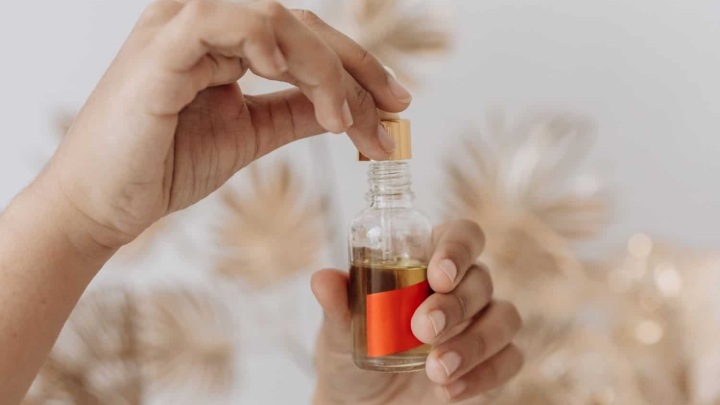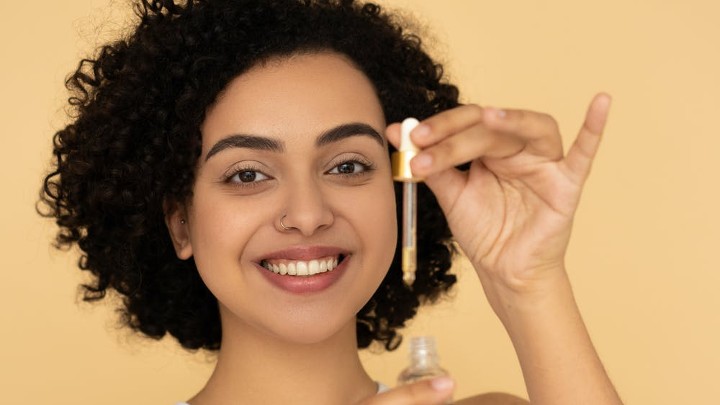Face oil is a skincare product that has raised a lot of eyebrows but has gained wide acceptance, especially since many of the myths surrounding it have proven untrue.
Face oil is an oil-based formula with a liquid consistency, highly concentrated with natural nutrients.
You can call these products “a gift from nature to the skin.” Despite how natural face oils seem, people still have doubts about their necessity and formulation. This is because some oils have been the trigger of sudden breakouts in some skin types.
Before you choose to use oils for your face or not, there are some things you need to know about this product. Ahead, this article details information about face oils- what they are, why you need one, and how to choose and use face oils.
What is face oil?
Face oils are an all-natural class of skincare products that provide your skin with nourishment, hydration, and optimum protection.
Face oil is much heavier than other skincare products, so they usually come in at the end of your routine. The exception is that you’re creating a special routine with another product to target a particular skin issue.
Face oils have both occlusive and emollient properties, which make them act as a seal over your skin and soften it. This seal helps to seal in moisture, keep skincare ingredients that may have been applied trapped in, and protect your skin.
These natural oils contain essential oils and carrier oils. The different oils contain high concentrations of essential fatty acids, vitamins, minerals, and antioxidants that are necessary for the health, appearance, and texture of your skin.
Does face oil work?
Yes, it does.
Face oils are more than an ostentatious product in your routine. They are moisturizing and create an extra protective layer over your skin to keep vital ingredients in and keep irritants and microbes out.
Facial oil contains emollients that soften your skin and keep it moistened against harsh, dry weather conditions that can strip your skin of its natural moisture.
Additionally, some oils have a molecular structure that mimics that sebum. They do not only fill in their hydrating roles, but they also help to regulate sebum production. Consequently, you can manage acne breakouts.
The hydrating property of face oils helps to keep blemish-affected areas moist and prevent the formation of scars.
What is face oil used for?
Face oil is used to retain moisture in the skin during harsh weather conditions when a moisturizer alone will not suffice.
Face oils contain high amounts of vitamin E, a natural humectant that attracts moisture to the skin. Also, applying oils to the skin helps to glow up aging and dry skin, which is characterized by dryness and a dull complexion.
Face oils contain antioxidants that protect your skin from environmental irritants that can induce premature aging.
Furthermore, these oils contain essential fatty acids like oleic acid, linoleic acid, and linolenic acid, which fortify the natural lipid barrier, increasing resilience and preventing moisture loss. Moreover, it helps to keep out microbes while retaining moisture.
As counterproductive as it sounds, some face oils could be your goodbye to acne, eczema, psoriasis, and other skin conditions. Cosmetic uses of face oils include oil cleansing, enhancing makeup products, and application.
In addition, topical application of oils will soften your skin and improve the overall health and look of your skin.
Is face oil a moisturizer?
Face oil is not the same as a moisturizer, although it has moisturizing ingredients.
Moisturizers contain active ingredients which face oils do not have. Moreover, oils are more occlusive than moisturizers.
Face oils support the moisturizing property of a moisturizer. However, in certain weather conditions and temperatures, oils may be more moisturizing for certain skin types like dry skin. Nonetheless, face oils are not the same as moisturizers.
Is face oil body oil?
Face oils and body oils have a thin difference between them.
Some of the oils labeled body oils may have a heavier formula and contain ingredients like fragrance which facial skin cannot always tolerate. However, some face-body hybrid oils like jojoba oil, almond oil, argan oil, and many others can be used for both face and body without side effects.
If you want to use a product labeled body oil for your face, you should check the ingredients list for any other ingredients facial skin cannot tolerate.
Is face oil a makeup primer?
Face oil is not the same as your makeup primer, however, it can suffice to give your MUA a sleek canvas to apply foundation.
It gives you a seamless finish and prevents your makeup from looking cakey or coming apart.
Other cosmetic use for face oils includes mixing it with makeup foundation to make it lighter and using it as a cleanser to remove makeup. In addition, it is completely safe for your face and eye area.
How to choose a face oil
Although oils are natural, and it looks like it’ll be okay to put just any oil on your face, you really should not. Each skin type has its peculiar needs and concerns.
Therefore, oils that perfectly target these issues and do not cause adverse effects should be used on your face.
Face oils for oily and acne-prone skin
While it seems counterintuitive to apply oil to oily skin, it is necessary. The ideal face oil for oily skin can be your skin’s gateway to less greasy skin and fewer breakouts.
Oily and acne-prone skin types should use face oils that perfectly mimic sebum to regulate its production. Also, because of the likelihood of frequent acne breakouts, your face oils should be non-comedogenic and lightweight.
Examples of such oils include jojoba oil, argan oil, tea tree essential oil, green tea essential oil, marula oil, lemon essential oil, and rosehip oil.
Face oils for dry skin
Dry skin is often associated with dehydration, cracks, fine lines, and sometimes inflammation. This is because your skin is producing insufficient levels of sebum, which is necessary for skin moisture and a functioning natural barrier.
A face oil like maracuja oil will help to balance moisture, heal the cracks, plump your skin back to its youth, and smoothen it. Other highly hydrating oils include almond oil, grapeseed oil, coconut oil, lavender essential oil, sandalwood essential oil, and avocado oil.
Face oils for sensitive skin
Face oils for sensitive skin types must be calming and unrefined. Essential oils cause skin flares which may be quite extra with this skin type. The peculiarity of this skin type is that it flares at what may be widely accepted by every skin type.
Sensitive skin fares better with oils that are highly rich in vitamin E, an antioxidant and a humectant. It’ll protect your skin from environmental irritants and calm it with moisture. Such oils include argan oil, chamomile essential oil, lavender essential oil, hemp oil, and apricot oil.
Face oils for combination skin
Combination skin, as the name implies, is a skin type characterized by the features of more than one skin type. It could be oily and dry or normal and oily/dry. Oils for dry skin may not effectively regulate sebum production and treat acne.
Jojoba oil, pomegranate oil, sunflower oil, lavender essential oil, cedarwood essential oil, and marula oil are lightweight oils that do not leave residue on your skin. They manage acne and hydrate the dry areas of your skin at the same time.
Face oils for mature skin
Mature skin needs face oils that provide optimum moisture boost that will smoothen fine lines and wrinkles. Also, your face oils should target skin rejuvenation and firming to restore youthfulness with an uncompromised glow.
Moringa oil, sandalwood essential oil, almond oil, lemon essential oil, frankincense essential oil, and pomegranate seed oil help to improve the appearance of fine lines and wrinkles and make your skin supple.
Face oils for normal skin
Normal skin is a balanced skin type; the skin has sufficient levels of sebum and moisture and is blemish-free. Regardless, this skin type needs face oil to maintain normalcy.
Moreover, you should avoid heavy-weight oils. Otherwise, you may expose your skin to breakouts and other skin issues. Examples of oils that suit normal skin include jojoba oil, retinol oil, squalene oil, and argan oil.
How to make your own face oil
To make your face oil, start with picking oils that suit your skin and this includes essential and carrier oils. Follow this simple guide to help you mix your oils at home:
- For every tablespoon of carrier oil, add about 5 drops of essential oil (you should ration the drops of essential oil among the number of essential oils you’ll need)
- Then, pour all the oils into a dark glass amber bottle and cover it firmly
- Thereafter, roll the bottle between your palms to warm it and mix the oils
- Keep the bottle standing in a cool, dry place away from sunlight
How to apply face oil
- Use a mild cleanser to remove residues of oil, dirt, makeup, and grime. For your evening routine, you may want to double cleanse
- Then, you may exfoliate if you’re not going to apply retinol or any AHA/BHA down your routine
- After cleansing, apply serum all over your face, undereye, and neck to prep your skin to receive other products
- Thereafter, take a pea-sized amount of moisturizer and rub it all over your face to seal in moisture
- Follow up with other creams (spot treatment or eye cream)
- Then, take your face oil into your palm and gently massage it all over your face including your undereye and neck. However, be careful not to get oil into your eyes
- Finish off your daytime routine with SPF. For the night routine, face oil is the last step.
FAQs

Is face oil necessary?
Yes, it is.
Face oil helps your skin when it is producing little or no sebum to moisturize and protect your skin. It also helps fortify your skin with nutrients like fatty acids, vitamins, and minerals that your skin needs.
Regardless of your skin type, you need face oils to protect your skin and address skin concerns.
Can you use face oil by itself?
Yes, you can.
Face oils can be used alone to moisturize your skin, glow up your face, and for a facial massage. If you’re using an oil that suits your skin type, you should have no worries.
However, if it’s an essential oil, you should dilute it with carrier oil to avoid skin flares like a rash.
Do face oils clog your pores?
Face oils should not clog your pores if you’re using a non-comedogenic oil.
Also, they are usually made of lightweight oils that quickly absorb and do not leave residues on your skin. Moreover, they help to treat acne.
Conclusion
Face oils are oil-based products packed with high concentrations of nutrients that nourish, hydrate, protect, address skin concerns, and glow up your skin. And there is a face oil that is best suited for your skin type.
Face oils are highly beneficial for every skin type and its peculiar concerns, helping to improve the appearance and feel of your skin.
These oil-based products have found many uses in the world of skincare. If you’re using a product that is right for your skin type, you have nothing to fear. With consistent and moderate use, better skin days are close by.
Thanks for reading.
Get more helpful beauty tips here on MBGON.
